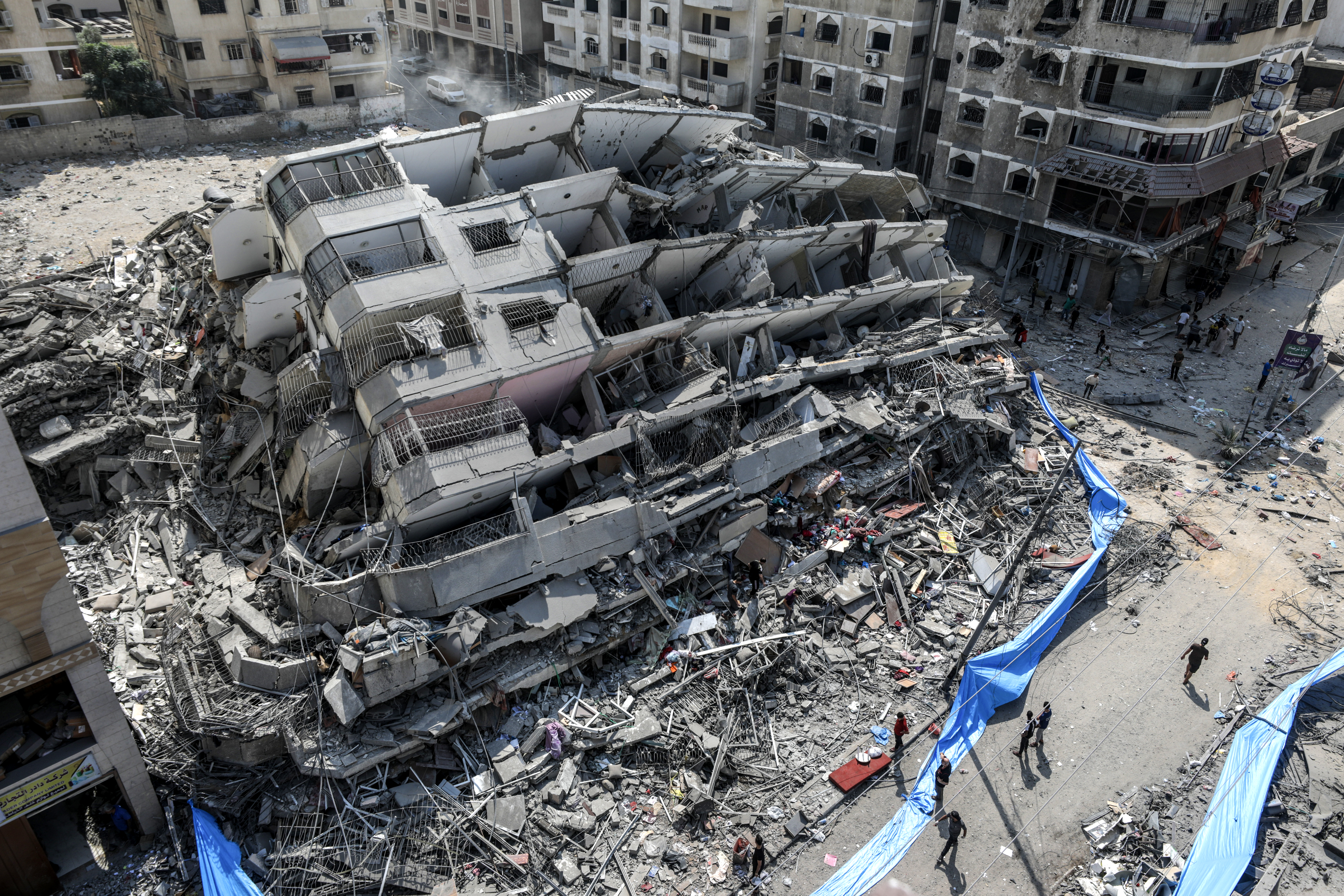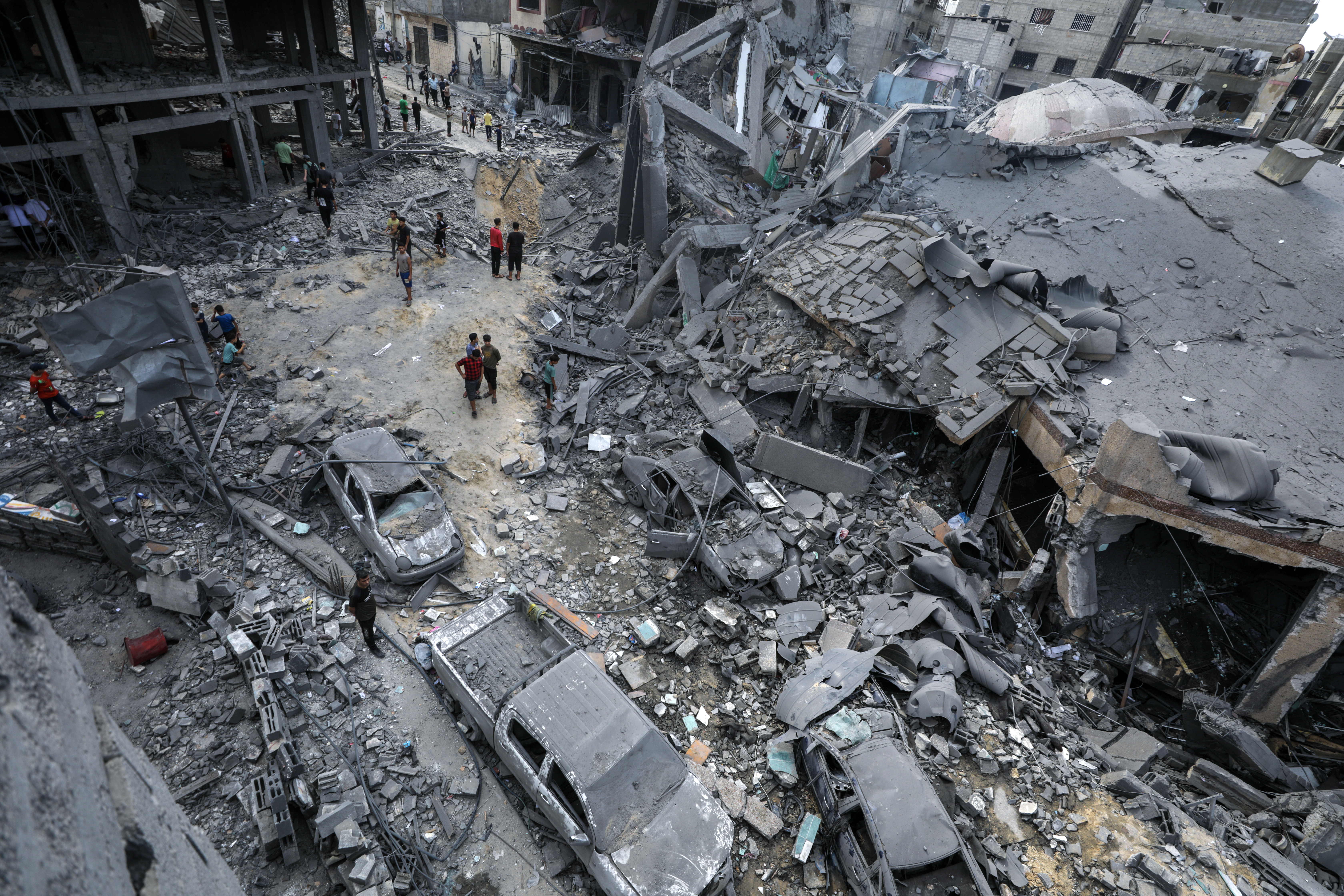President Cyril Ramaphosa is leading a seven-nation African Peace Mission to try to address Russia’s war against Ukraine. Some believe it has achieved some success, particularly because Ramaphosa has been able to deliver some straight messages to his friend Russian President Vladimir Putin about the need to repatriate abducted Ukrainian children and exchange prisoners of war.
Could he do the same in the Middle East, perhaps leveraging the ANC’s ties with Hamas?
SA ‘ready to mediate’
The government offered its services for peace in its statement this weekend condemning the violence between Israel and Gaza and calling for an immediate ceasefire.
“South Africa stands ready to share its experience in mediation and conflict resolution as it has done on the continent and around the world,” it said.
Zev Krengel, the national vice-president of the SA Jewish Board of Deputies, told a press conference on Monday: “I think South Africa could have had a major role to play. I think it still could, with our relationship with Hamas and with Egypt.
“We have had quite a bit of success where we’ve been the honest broker, where both sides have listened to us. So how could we have played a role in Russia? Because we’ve always had the ear of Putin … so when President Ramaphosa went there he could do something.”
 People inspect the destroyed Al-Aklouk Tower after Israeli air strikes, in Gaza City, on 8 October 2023. (Photo: EPA-EFE / Mohammed Saber)
People inspect the destroyed Al-Aklouk Tower after Israeli air strikes, in Gaza City, on 8 October 2023. (Photo: EPA-EFE / Mohammed Saber)
But Krengel added that South Africa’s problem was that Israel did not see it as an honest broker because South Africa had downgraded its embassy in Tel Aviv, hadn’t received any diplomatic visits and in this conflict had shown no sympathy for the Israelis who had been killed, injured or abducted by Hamas.
“It’s a bit like asking Belarus to do a peace deal between Russia and Ukraine. They sit in the Russian camp. It doesn’t help.”
Read more in Daily Maverick: SA government claims it has been consistent on the Palestine question
However, Elizabeth Sidiropoulos, the national director of the SA Institute of International Affairs, didn’t accept Krengel’s analogy between South Africa and Belarus — mainly because SA was not a neighbour of Palestine and by no means dependent on it as Belarus is on Russia. And so, she said, there was a possibility of Pretoria playing a role.
“There is potentially an opportunity, as with Ukraine, for South Africa to use its good offices with one side, working together with other parties. Because it’s a bit like Ukraine, it’s not going to be one set of processes that are going to lead to a resolution. It’s different groupings potentially working together, or coordinating at any rate, that might help.”
Roelf Meyer, head of the In Transformation Initiative (ITI) which has mediated in many international conflicts, agreed that South Africa could play a role, but only in a collective effort with others.
Meyer recalled that in 2015 and 2016, ITI had brought representatives of Hamas and Fatah (which runs the Palestinian National Authority in the West Bank) together in South Africa, to try to overcome their divisions and give impetus to the stalled peace process. The initiative was backed by the Barack Obama administration and had made progress. But it faded after Donald Trump took office.
 Palestinians walk amid the rubble of a destroyed area after Israeli air strikes in Gaza City on 9 October 2023. (Photo: EPA-EFE / Mohammed Saber)
Palestinians walk amid the rubble of a destroyed area after Israeli air strikes in Gaza City on 9 October 2023. (Photo: EPA-EFE / Mohammed Saber)
There were earlier efforts by South Africa to achieve peace in the Middle East, mainly the Spier Initiative under the then president, Thabo Mbeki, in 2002 which brought members of Israel’s ruling Likud party and Fatah together for talks at the eponymous wine estate in Stellenbosch. But the Israeli government lost interest.
Meyer said the problem with any South African Middle East peace initiative was that the SA government had lost influence on the Israeli side because of its pro-Palestinian position. But it still had contacts with Hamas.
“And so if we can find collaborators with access to the Israeli side, we could play a role.
“But first the dust will have to settle at least,” he added, noting that the incursion by Hamas had probably given even greater control to the Israeli right wing.
Moderates sidelined
Sidiropoulos also questioned whether the conflict was yet ripe for mediation, asking, “At this point, does either side want a solution?”
She added that both the Israeli and Palestinian sides had become increasingly radicalised and polarised over the past few years. Moderate voices on both sides had ceded ground to radicals or had simply been pushed to the margins.
The Palestinian National Authority was increasingly seen by many Palestinians as having failed to strongly advance or articulate Palestinian opposition to Israel’s occupation of Palestinian territory.
That had strengthened Hamas, which created a problem since Hamas did not recognise the existence of Israel. That obviously undermined the possibility of achieving the two-state solution that the international community wanted.
Sidiropoulos said it was clearly not acceptable that Hamas had attacked civilians in violation of the Geneva Conventions.
On the other hand, the various Netanyahu administrations had done nothing to reduce Jewish settlements in the West Bank, or stop the ill-treatment of Palestinians, or the way in which the harder-right elements of his administration — “like a red rag to a bull” — had provocatively visited the Al-Aqsa Mosque in Jerusalem.
Sidiropoulos said that at the moment everyone was caught up in the fighting and the attacks by Hamas on Israeli civilians and the seizing of hostages.
“But at some point, sounder minds will have to prevail. And at that point, both sides could potentially use all the connections and leverage points they might have.
“And I do think, on the Hamas side, South Africa could potentially play a role. But the stumbling block in any negotiations is about Hamas’s position on Israel’s right to exist.”
‘Genocidal violence’
However, Zeenat Adam, the deputy executive director of the Afro-Middle East Centre in Johannesburg, took a very different view.
She said, “The South African government may have a role to play in trying to resolve the current situation in the Middle East — by remaining firmly committed to the principles of international law and by discouraging new members of the BRICS to be drawn into potential protracted conflict, and refraining from normalisation with Israel until and unless the genocidal violence against Palestinians is halted and settlements are scaled back to open the way for concerted negotiations towards long-lasting peace.”
Adam appeared to be referring to the Abraham Accords, the reconciliation deals that Israel has been signing with Arab states, starting with the United Arab Emirates (UAE) and Bahrain. A major breakthrough was expected in this initiative with indications that Saudi Arabia would also recognise Israel.
There has been conjecture that one of the reasons for the attack by Hamas on Israel was in protest against these deals with Arab states, which the Palestinians regarded as an abandonment of their cause.
Both the UAE and Saudi Arabia joined BRICS at its August summit in Johannesburg and Adam appeared to be urging Pretoria to discourage these new member states from normalising relations with Israel.
“South Africans have recognised and understood the apartheid, settler-colonial siege of Palestinians and state-sponsored terrorism by Israel for decades would inevitably lead to retaliation by Palestinians,” Adam said.
“South Africa consistently supported peace initiatives at both governmental and civil society levels until it was clear that the settler colonial Zionist state was disingenuous in all negotiations, pursuing a policy of violence and oppression, whilst flagrantly violating international law with absolute impunity under complete protection of its founder, the United Kingdom and its funder and enabler, the United States of America.
“All previous negotiations were bound to fail when dishonest parties were intent on the subjugation and capitulation of Palestinians.”
Read more in Daily Maverick: Israel pounds Gaza, battles Hamas raiders after bloody incursion
At the Jewish community’s press conference, Karen Milner, the national chairperson of the SA Jewish Board of Deputies, said that the South African Jewish community, which had very close family connections with Israel, had been shaken to the core by the “barbarism” Hamas had meted out to Israelis in its incursion.
“Every one of us knows someone who knows of someone who has been killed or is missing in Israel.”
Krengel said, “We know of South Africans that have probably been captured or murdered and are in Gaza and our government doesn’t care. We haven’t had one phone call.”
He said Pretoria’s downgrading of the embassy in Tel Aviv had made it difficult for the government to help South Africans who were trying to flee the country or caught up in the conflict. DM




 Palestinians walk amid the rubble of a destroyed area after Israeli air strikes in Gaza City, on 9 October 2023. (Photo: EPA-EFE / Momammed Saber)
Palestinians walk amid the rubble of a destroyed area after Israeli air strikes in Gaza City, on 9 October 2023. (Photo: EPA-EFE / Momammed Saber) 